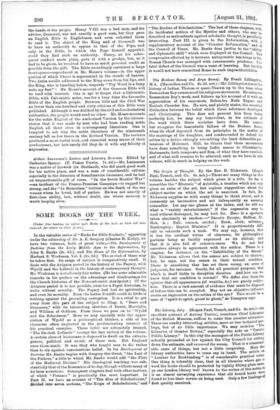The Origin of Thought. By the Rev. D. Nickerson. (Kegan
Paul, Trench, and Co. 6s. net.)—There are many things in this volume besides the subject which gives it a title. So far it resembles the " Rhetoric " of Aristotle, a treatise which not only gives us rules of the art, but copious suggestions about the subject matter on which the art is exercised. In fact, Mr. Nickerson supplies us with many things to think about, and is commonly an instructive and not infrequently an amusing counsellor. Let any one glance at the index, and he will see what a " variety entertainment," if the expression may be used without disrespect, he may look for. Here is a specimen taken absolutely at random:—" Bacon's Essays; Balfour, Rt. Hon. A.; Ball, cannon, cricket ; Bank, clerk, solvency Bankruptcy; Baptist Minister." It is proportionately di& cult to estimate such a book. We may say, however, that it has the cardinal virtue of clearness, its philosophical portions being as lucidly expressed as its ethical; and that it is also full of common-sense. We do not find ourselves always in agreement with the author. There is a chapter, for instance, on the "Infallibility of the Senses." Mr. Nickerson allows that the senses are subject to illusion ; but, he says, not the senses in their normal condition. There is something that has set them wrong, an error of judgment, for instance. Surely, for all practical purposes, that which is itself liable to deception deceives. And how can we know that our condition is normal? We differ also from the opinion that all appearances (of wraiths, &c.) are purely subjec• tive. There is a vast amount of evidence that must be disposed of before this can be accepted. May not an objective influence create an impression on the retina of the eye ? This would be a case of "spirit to spirit, ghost to ghost," as Tennyson says.


































 Previous page
Previous page